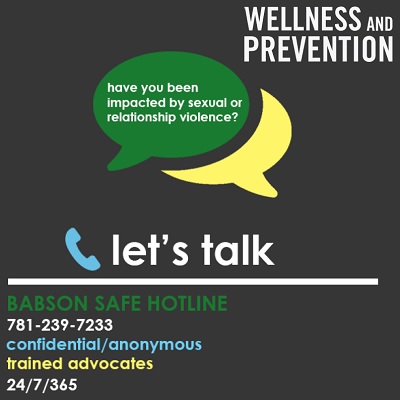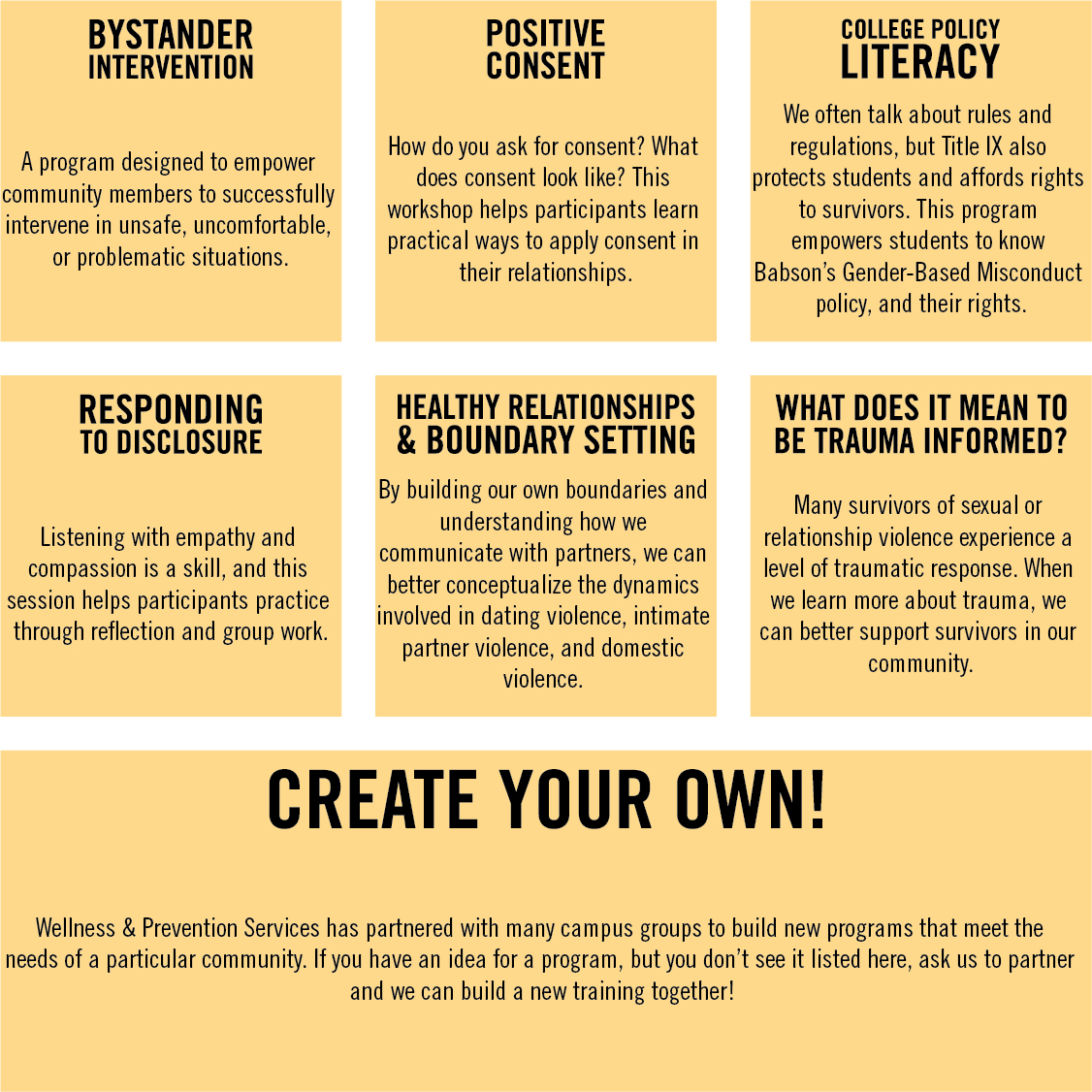Sexual Assault Prevention and Response Services
Sexual Assault Prevention and Response Services (SAPRS) is responsible for the development, implementation, and evaluation of a comprehensive, empowerment-based, and trauma-informed violence prevention, and intervention program for Babson students.
Student Services and Programs
Wellness & Prevention Services offers free and confidential consultations by appointment or during our walk-in hours. Consultations can be used by Babson students to seek support or referrals, and/or to discuss concerns for friends, partners, and family members. Consultations can also occur over the phone. To schedule an appointment, email wellness@babson.edu or call 781-239-5200.
The College has many means of support for survivors, including the ability to privately and sensitively advocate for a wide variety of accommodations and services that uniquely meet the needs of individual students. Accommodations may be requested regardless of whether a student has filed a formal report. Accommodations may include, but are not limited to: academic requests, housing changes, and No Contact Orders.
Wellness & Prevention Services also provides medical and legal advocacy. Specifically, an advocate can provide guidance around and accompaniment to medical appointments related to sexual and/or relationship violence (for example a SANE exam), or relevant legal appointments (for example, requesting a harrassment prevention order).
A core function of Wellness & Prevention Services is to provide holistic case management for students in need of on-campus and off-campus resources related to gendered violence.
Information for Students who have Experienced Sexual Assault or Rape
Safety
Make sure you are in a safe environment. Wellness & Prevention Services advocates can also help with safety planning and implementing measures which will increase your safety and security.
Medical Attention
If applicable, contact a local provider for medical services. You have access to Babson Health Services for STI (Sexually Transmitted Infection) testing and other relevant testing and care. Additionally, you can receive transportation to a local emergency room for a SANE (Sexual Assault Nurse Examiner) exam. This program has specially trained nurses who can examine you and collect evidence. Advocates can also provide medical advocacy and accompaniment. Confidential medical care is available regardless of whether you report to the College or local law enforcement. You can also go to a SANE program on your own. SANE hospitals in the area are available at:
- Newton-Wellesley Hospital
- Beth Israel Deaconess Medical Center (Boston)
- Boston Medical Center
- Brigham and Women’s Hospital
- Cambridge Hospital
- Children’s Hospital
- Massachusetts General Hospital
Evidence Preservation
If you are interested in preserving evidence, place your clothing and other items (sheets, blankets) in a brown paper (not plastic) bag. Avoid drinking, bathing, showering, douching, brushing your teeth, using mouthwash, combing your hair or changing your clothes. Physical evidence will be collected if you choose to visit an Emergency Room. Save or screenshot any technological evidence (text messages or social media posts for example) and be mindful of camera footage that may be available.
Reporting Options
You have many reporting options at the College, including private and confidential options. Babson also offers a confidential rape crisis hotline to help students report 24/7/365. For more information, please view the Crisis Response section below and visit our Resources page.
Get Support
There are many on and off-campus resources available for you to support your recovery and overall well-being. Wellness & Prevention Services can provide a space for support and we can also refer you to Counseling and Psychological Services. In addition, there are many off-campus organizations that provide therapeutic care.
Information for Students who have Experienced Intimate Partner Violence or Stalking
Points of Contact
Evaluate your points of contact with an abusive partner/perpetrator. Wellness & Prevention Services can help with housing accommodations, phone/email privacy, financial independence and economic justice, and other supports.
Safety
Make sure that you are in a safe environment. Wellness & Prevention Services advocates can also help with safety planning and implementing measures that will increase your safety and security.
Support Networks & Community
One option you have is to surround yourself with friends, family, and loved ones. Sometimes, survivors of intimate partner violence can feel isolated from loved ones while in an abusive or unhealthy relationship, and connecting with your support network can be helpful. You can also build support networks in the community with providers and other survivors. Wellness & Prevention Services can facilitate community connections and present a survivor with options.
Supporting a Friend or Loved One
Many times, survivors will disclose to friends, family, and partners. While it can be difficult to hear about a loved one experiencing sexual violence, knowing how to respond to this disclosure will help your friend in their journey and will help keep you safe as you become a helper.
Say Thank You & Believe
Saying, “thank you for telling me” acknowledges how difficult it can be for a survivor to disclose. Also, sharing that you believe a survivor can be validating and builds trust.
Practice Active & Empathetic Listening
Being an active listener allows your friend or loved one to make the space and conversation what they wish it to be. Allowing a survivor to control the space, including the disclosure, can be a key to empowering them as they move forward.
Be Aware of Space
Check-in with your friend or loved one about where you are having this conversation. Make sure that the space is private and comfortable for the survivor.
Be Informed of On & Off-Campus Resources
Presenting options to a survivor helps that person maintain agency. While you can’t make decisions for a survivor, you can help them research possible next steps on-campus or in the community.
Empower Your Friend/Loved One
Support and respect a survivor’s decisions, even if a survivor chooses to do nothing.
Ask What You Can do to Help
Sometimes, it is hard to know what to say to a survivor, especially when there is silence. When in doubt, ask how you can help.
Know When to Reach Out for Support
As a friend or loved one, you can be a tremendous support for a survivor. Wellness & Prevention Services can also provide services and consultation to you as a friend or loved one, too. We want to make sure that you have the help that you need in order to ensure your wellness.
Respect Privacy
Your survivor trusted you with their experience, remember that the survivor's privacy is imperative.
Practice Self-Care
Remember to take time to practice self-care. This may mean adding 5 minutes of mindfulness to your morning, taking a yoga class, or connecting with services.

The SAFE Hotline is a Babson-specific rape crisis hotline that can be accessed by students 24/7/365. The hotline is staffed by trained advocates who are ready to help survivors, friends, or campus partners. The SAFE Hotline is answered in the office on weekdays between 8:30 AM - 4:30 PM and is then transferred to staff member when the office is closed.
In Wellness & Prevention Services, we know that survivors need support during any hour and the SAFE Hotline is available to help students’ access services without barrier. If you, or a friend or loved one, needs confidential on-call assistance, please do not hesitate to call 781-239-7233 (SAFE) or 7233 from an on-campus landline.
What if No One Answers?
While advocates will closely monitor the line and is committed to quick response, there is a possibility that a call may be missed. If this happens, please leave a message with a safe phone number for an advocate to reach you promptly. Remember, leaving a voicemail with contact information is the only way that an advocate can respond to your call appropriately.
SAFE Hotline 781-239-7233
Staff are often available to build, collaborate, and implement programs that help educate and train our community around sexual violence, prevalence, language, policy, bystander intervention, trauma-informed practice, and more. If you have a program request for your group, staff, or team, please reach out to Wellness & Prevention Services so that we can connect you with the most appropriate resource.
Prevention at Babson requires a comprehensive approach that addresses the multiple levels of influence around violence and victimization. It is critical to address the individual, their relationships, and their community and cultural environments. By building relationship skills, discussing policy, procedure, and practice, addressing social norms, and promoting bystander intervention, Babson hopes to significantly change behavior and reduce harm.
Online Programs
There are many great resources online to start educating yourself or others. Here are some of Wellness & Prevention Services’ favorites:
